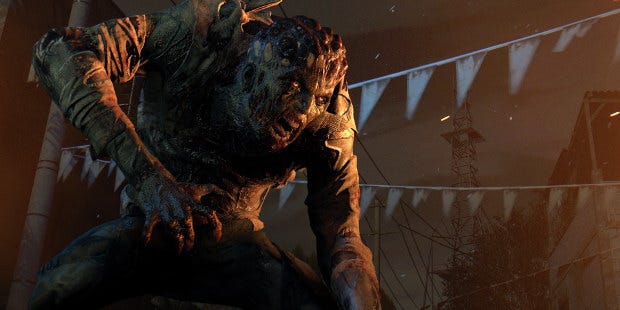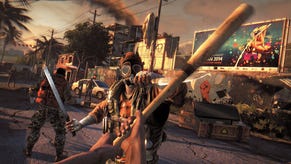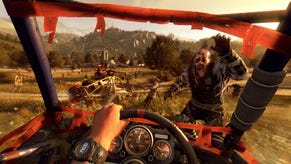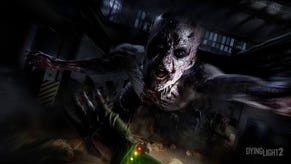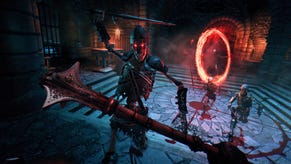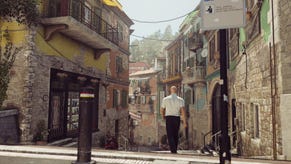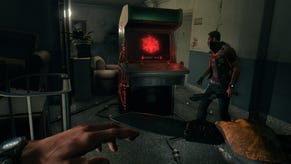Wot I Think: Dying Light
A magnificent medley
Dying Light [official site] is the new zombie game from the creators of the original Dead Island. Adding parkour to the first-person melee combat and crafting of the original, it has the appearance of a game suffering something of an identity crisis, packed with repurposed elements but lacking a clear direction. Review copies arrived late, causing eyebrows to raise in suspicion, and after several days and nights with the game, I've emerged with extensive thoughts.
Curiosity kills the cat-like. I've perfected my parkour and can scarper up the side of a building faster than Peter Parker. Thanks to agility and power upgrades, I can effectively sprint across the scalps of a zombie mob, kicking a few craniums into touch as I go.
I'm at a late point in Dying Light's story mode and thanks to the time I've spent levelling up my abilities and crafting overpowered electrocution biffsticks, nothing that walks during the relative safety of the daylight hours should be able to lay a finger on me, let alone hurt me. And yet I can't seem to spend more than a couple of minutes outside a safe zone before trouble finds me or, more accurately, I find trouble.
The beauty of Dying Light is that there's always something happening. The slums and their surroundings aren't the most evocative of settings - although they can be strikingly beautiful - but they feel alive in a way that is rare in expansive glossy gamespaces. As you wander the streets and leap across the rooftops, you'll often hope to be distracted from whatever humdrum errand the dreary cast have set for you. The game never fails to deliver. Whether it's a lone zombie, stumbling through the streets like the lost member of an apocalyptic pub crawl, or a random gang of marauders armed to the teeth, there's always somebody to play with.
Fancy leading those marauders into a massive crowd of zombies? You can do that and then watch as all hell breaks loose. Perhaps you'd prefer to taunt your enemies from a rooftop, lobbing knives, throwing stars and molotovs from on high? Fair enough, but don't be surprised if they manage to find a way onto your perch. There might even be a nearby trap that you can remotely trigger, causing an explosion that brings every dead thing that can crawl or walk into the vicinity.
Dying Light is consistently entertaining. As soon as the overlong prologue is out of the way, the plot mostly takes a backseat and leaves you to speed off in whatever direction you choose. You could become a scavenger, sneaking through buildings to find junk that can be transformed into deadly weapons, or you might enjoy exploring the rooftops, and trying to gain access to the secluded and secure nooks and crannies of the world. If you're as amused by the satisfyingly solid melee combat as I am, you could spend an hour or two squishing skulls.
Each of those activities will help you to progress through one of the three skill trees - Agility, Power and Survival - and, as I did, you'll transform from a man capable of carrying sixteen large metal pipes in his pocket while leaping from one building to another, to a man capable of kicking zombies to mush while gleefully bouncing around the city like a deranged Zebedee. Did I mention that Dying Light is gloriously entertaining?
There's a catch. There's always a catch, and in this case you might be able to guess what it is. If you've ever played a game, or paid any attention to the kinds of games that people play, you'll probably be aware that Dying Light appears to have borrowed all of its bits from various places. It's Dead Island with a bit of Far Cry 3, plus some AssCreed parkour, and so on and so forth. Of course, at some level everything is an amalgamation of influences and borrowings, but Dying Light looks like a particularly obvious magpie, with a collection of shiny things plucked from elsewhere.
That does mean it's rarely surprising. Everything works as you probably expect it to but, on the whole, all of the parts work exceptionally well. There's no small amount of skill involved in the combination of all these elements. If I were to criticise the game for being derivative, I'd perhaps say that it feels more like craft than art, but it's certainly good, solid crafting.
I'll move onto the most original aspect - the day/night dynamic - in a few paragraphs, after covering the basics. Melee, which is the bulk of the combat, feels weighty and has some extremely effective hit locations. Thwack a zombie on the back of the legs and it'll buckle to the floor, where you can continue to pummel it, preferably aiming for the head, which will burst like a melon in a war. Strap a couple of batteries and a power cord to a weapon and it'll cause limbs to twitch as the corpse collapses. The violence is extreme and when I was splattering a shambler over a wall becomes just a little too amusing, I often had to remind myself that they're already dead. It's fine. I mean, I probably shouldn't find killing dead people quite as funny as I do, but it's definitely fine.
Physics have been improved since Dead Island and the use of vertical environments means you'll spend a lot of time pushing zombies off things. This is to be encouraged, as is climbing out of reach and then making a racket so that zombies on nearby rooftops decide they want to eat you and foolishly launch themselves into the air. I can honestly spend an hour just walking around and watching the way they interact with the world, confused and sometimes weirdly tragic.
All of that climbing and jumping is courtesy of the parkour system. It's - ahem - leaps and bounds above anything that AssCreed has ever offered. Ubi's series is fine if you want to drive up the side of a cathedral by pressing 'W' or pushing a stick forwards, but Dying Light's parkour is about precision. You'll need to target ledges to grab onto them, which means a lot of your ascents will be slow and thoughtful. Eventually you'll move fluidly from one foothold to the next, but it'll take time and mastery.
The physicality of your avatar's body is strong as well and while there are occasional oddities - most often, I grab a ledge a split second after seeming to have fallen past it - the sense of being present in the world rarely fades. Even though you're doing impossible things, your character never has the invincibility or biological get boosters of a superhero. Every action feels like it requires effort, even if climbing and jumping never seems to drain the stamina bar that a few pipeswings will diminish completely.
And then there's night time. A couple of missions in, I was ready to throw a tantrum about how the danger of the darkness had been wasted. It seems as if the switch to the city at night is going to be a scripted occurrence, for certain story missions only, but thankfully that's not the case. All the time that you're outside a safe zone - areas that can be unlocked by clearing of unlife as you explore - a timer is ticking down, and eventually you'll be warned that you only have a few minutes to get to safety. That can lead to mad scrambles and desperate mistakes. Nothing worse than being pinned down by a crowd of hungry corpses when you need to be two blocks away, tucked up in bed in a brightly lit compound.
At night, you see, the real monsters come out to play. Capable of beating you in a race and equal to your climbing skills, the Volatiles are Dying Light's true horrorshows. You can run from them, pressing 'B' to glance over your shoulder as they chase, but that's only advisable if there's a safe zone nearby. They'll catch you eventually. Instead, you should hide.
Night time is either a panicked chase or a stealth game. The Volatiles are marked on your map, vision cones and all, and it's possible to evade them as you make your way home. It's another borrowed element, I guess, but, like the rest, it's well executed. There are tricks that make the night less formidable but it takes a while to discover them. Until then, it's better to rest somewhere safe and wait until morning. Except, experience points are doubled at night, so there's a reward at the end of all that risk.
Like so much else, night time trips aren't just a means of gaining experience, they're a way to make new stories. I've taken to setting myself meaningless tasks, with half-baked roleplayed reasons for carrying them out in my head, just to spend time playing in the world.
There's a reason I've spent so long writing about making my own fun and my own stories, and that's because Dying Light's most notable failing is in the story department. The main character is mostly dull but occasionally transcends tedium by behaving in a manner so incredibly stupid I was almost reduced to screaming at my screen.
He's working for The Man, you see (The Man is the GRE, represented by A Woman with a sinister voice that you must report to on your radio) and if The Man tells him to burn all of the drugs used to treat viral infection, that's exactly what he'll do. After all, The Man is working in the best interests of innocent civilians, even if it just looks like they're doomed to be collateral damage in some obnoxious power struggle. Continuing the borrowings, there's one villainous sort whose every scene could be taken from a failed Far Cry villain audition tape.
On the whole, the dialogue and plot are as forgettable as they are predictable, and the best thing to be said about that side of the game is that cutscenes and conversations can be skipped with the push of a button. You'll miss nothing of importance by skipping them. Missions require you to go from a safehouse to a marker on your map, usually to collect something, occasionally to talk to and/or kill somebody. Sure, that's essentially the kind of task I set for myself when I'm ignoring the missions, but at least I don't pretend that anything I'm doing is for the greater good. I'm playing and when Dying Light ignores its plot, it's very good at letting me play.
There are times when you'll long for wide open spaces or a little more colour in the world, and the sheer quantity of stuff that you end up carrying around can seem overwhelming from time to time. You might even find yourself bored despite the emergent scenarios cropping up on almost every street corner, but then you'll be out late in the evening and in need of medical attention, and you'll see a pharmacy sign flickering in the distance. Suddenly the world feels that little bit more credible again, firmer somehow. You might need alcohol to add to the gauze you find, and then you'll see the neon light of a bar blinking on and off a couple of blocks away.
Maybe the door will be surrounded by zombies, or maybe it'll be blocked. Either way, let's say you painstakingly and silently make your way to the roof, one eye on your watch, and look for a way inside. Tension rises as you realise there are only minutes to spare before the Volatiles emerge.
And so you think, fuck it, and you lamp a zombie off a roof into a puddle of petrol and trigger a trap to set the poor thing on fire, watch as it stumbles into an oncoming horde and lights them up, only leaping from your perch to finish off the half-cooked crawlers with a hammer to the back of the skull. Or you shove your boot in a biter's mush just as it's about to grab you, and cackle as the momentum shift sends it reeling into a set of spikes sticking out of a traffic barrier.
That's when you realise there's something of Dark Messiah about Dying Light as well, and it's when you can finally tick that last box.
BINGO
Dying Light is the Frankenstein's monster of AAA games, an undead craft project made up of scavenged parts. As with the monster, however, Techland's latest is more than a shambling, stitched up chimera. The movement and melee feel solid and convincing, and although the world isn't as varied as I might have liked, it's a fantastic playground for thousands of emergent scenes, from panicked horror to improvised farce.
Like the best open world games, it's a factory for anecdotes and you'll create plenty of gems in its company. That's worth celebrating, no matter how derivative the various machines in that factory might be.
Dying Light is out now. I've spent a little time playing cooperatively and haven't found any major issues, but I'll write more about that and the asymmetrical Be The Zombie mode early next week.
